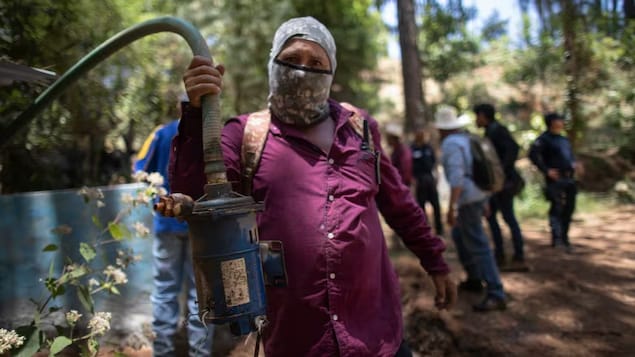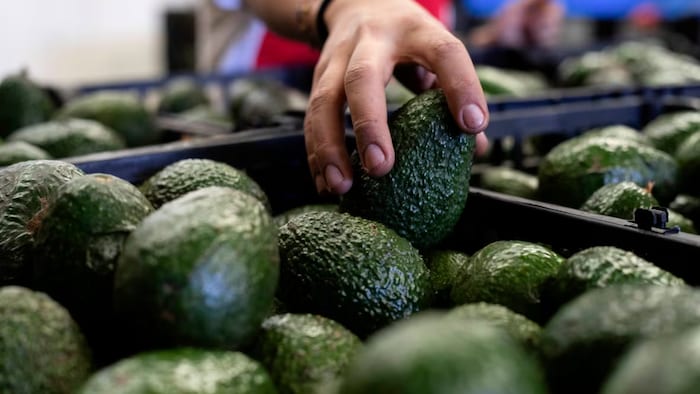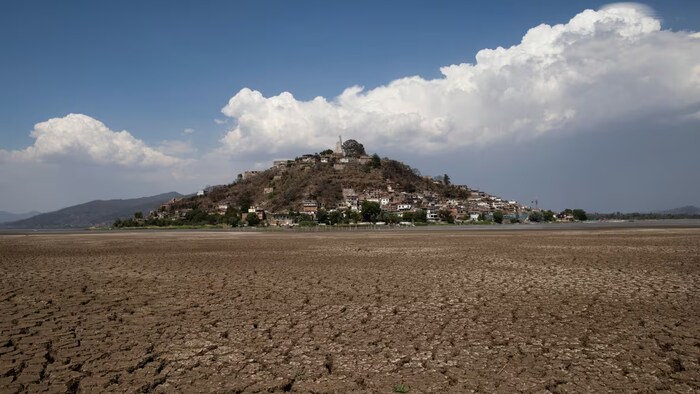- Home
- International
Mexican farmers take on avocado growers in fight for water during drought

A man shows a pump removed from an unlicensed water intake as his group of residents, farmworkers and small-scale farmers from Villa Madero, Mexico, dismantle illegal water taps in nearby mountains on April 17.
Photo: (Armando Solis/The Associated Press)
Mexico has received roughly half of its usual rainfall over the past year
As a drought in Mexico drags on, angry subsistence farmers have begun taking direct action on thirsty avocado orchards and berry fields of commercial farms that are drying up streams in the mountains west of Mexico City.
Rivers and even whole lakes are disappearing in the once green and lush state of Michoacán, as the drought combines with a surge in the use of water for the country's lucrative export crops, led by avocados.
In recent days, subsistence farmers and activists from the Michoacán town of Villa Madero organized teams to go into the mountains and rip out illegal water pumps and breach unlicensed irrigation holding ponds.
A potential conflict looms with avocado growers — who are often sponsored by, or pay protection money to, drug cartels.
Last week, dozens of residents, farmworkers and small-scale farmers from Villa Madero hiked up into the hills to tear out irrigation equipment using mountain springs to water avocado orchards carved out of the pine-covered hills.

A worker packs avocados at a plant in Uruapan, Michoacan, Mexico, on Feb. 9, 2024.
Photo: (Armando Solis/The Associated Press)
The week before, another group went up with picks and shovels and breached the walls of an illegal containment pond that sucked up water from a spring that had supplied local residents for hundreds of years.
In the last 10 years, the streams, the springs, the rivers have been drying up and the water has been captured, mainly to be used for avocados and berries,
said local activist Julio Santoyo, one of the organizers of the effort. There are hamlets in the lower part of the township that no longer have water.
Santoyo estimated that about 850 of the plastic-lined, earthen containment ponds have sprung up in the hills around Villa Madero, usually soon after planters have illegally logged or burned the native pine forest. Pines help the soil retain water, while avocado trees deplete it.
Francisco Gomez Cortes said residents of his hamlet, El Sauz, had been asking the landowner for 15 years to allow the spring to flow downhill to their community.
Residents desperate
After a year in which Mexico received only about half its normal rainfall, residents became desperate, and last week they worked up the courage to hike up the hill and rip out pumps and hoses for the avocado orchard.
We don't have enough water for human consumption,
Gomez Cortes said.
It's sad to walk down these trails that are now dry, when they once had trees and springs,
he said. They haven't even left any water for the [forest] animals that nest along the banks.
In a sign of how seriously the local government is taking the potential threat, the group was accompanied by the mayor of Villa Madero, who blamed outsiders for the problem.
There are people who aren't from this town, who come to our township and are invading us,
Mayor Froylan Alcauter Ibarra said. They are taking water away from the people who live downhill, and they don't realize these are the poorest people.
Residents say they don't want to deny water entirely to the orchards and have proposed an agreement to give landowners 20 per cent of the water from local streams, if they allow the remaining 80 per cent to keep flowing. They say they haven't gotten any response yet.
Drug cartels often make money from illegal logging and extorting money from avocado growers in Michoacán. The activists around Villa Madero have suffered threats, kidnappings and beatings in the past.
We are running a serious risk of them killing us for protesting,
Gomez Cortes said. Out of necessity, we are doing what the government should be doing.
The government has long done little to limit the growers and combat deforestation and water takeovers. But it seems to have developed an interest in preventing the looming conflict.
Tanker trucks
Alejandro Mendez, Michoacán's state environment secretary, acknowledges that the problem has gotten out of hand. So scarce has water become in the once lushly forested lake areas that orchard owners often send tanker trucks to suck thousands of gallons from the lake to water their groves.
As many as 100 trucks could be seen taking water from the lake,
Mendez said of the situation in March.

Cracked earth surrounds Janitzio Island in the partially dried-up Lake Patzcuaro on April 18, 2024. The lake has been reduced to about half its size due to drought, deforestation, sediment buildup and increased water demands from avocado and berry growers.
Photo: (Armando Solis/The Associated Press)
So about a week ago, the state police began patrolling the lake shore and detaining any truck drivers they saw extracting water. And Mendez said the state has begun monitoring agricultural holding ponds to see if any are being refilled from the lake.
While nearby Lake Patzcuaro has grown and shrunk in the past, this time it may be terminal; farmers are starting to pasture livestock and plant crops on the lake bed.
It will be difficult, because the humans and the livestock will survive, barely, but the animals and the plants will be gone — that will all be dried up and gone,
Gomez Cortes said.
Armando Solis (new window) · The Associated Press




